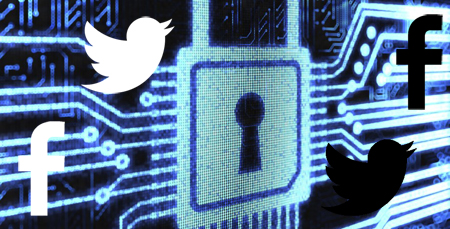The point of social media is sharing, along with openness and at least trying to be yourself over the internet. While there are a lot of things worth sharing and airing to the world, there are some things that are best unsaid – or in this case un-tweeted, un-Facebooked, and just kept to yourself.
Photos of credit cards or other financials
You might be thinking “nobody is stupid enough to do that,” but the truth is, there are people who have already done it. Some people have posted photos of their credit cards – account numbers and all, leading to some nasty comments. Clearly, this is not a wise thing to do. Others post photos of bills, leaving their names and addresses unblurred. This is a big risk that can easily be avoided. You are nullifying a section of Facebook’s Community Standards that state:
“We take the safety of our members seriously and work to prevent attempts to compromise their privacy or security, including those that use fraud or deception. Additionally, we ask that you respect our members by not contacting them for commercial purposes without their consent.”
Pranks
If you post a link that is seemingly interesting, make sure it really does lead to a worthwhile page. Otherwise, you are just wasting people’s time. Rickrolling, where linking people to a YouTube video of Rick Astley singing “Never Gonna Give You Up” was very popular, is now an annoyance. Show some maturity. This may be in violation of this section from Facebook:
“Before sharing content on Facebook, please be sure you have the right to do so. We ask that you respect copyrights, trademarks, and other legal rights.”
As well as Twitter, from their Twitter Rules:
“Copyright: We will respond to clear and complete notices of alleged copyright infringement. Our copyright procedures are set forth in the Terms of Service.”
It was said that Rick Astley asked the video to be taken down. When you Rickroll, you are committing a violation.
Vague updates
If you are being vague, you are most likely asking people for attention. You want them to ask you what it is about but the truth is, nobody really cares about your vague status updates.
Crass photographs – of yourself, no less
We are not all blessed with bodies of Greek gods and goddesses so it might be in everyone’s best interests to avoid uploading that self-portrait you took when you were fresh out of the shower. Besides, the terms of Facebook say that:
“Facebook has a strict policy against the sharing of pornographic content and any explicitly sexual content where a minor is involved. We also impose limitations on the display of nudity. We aspire to respect people’s right to share content of personal importance, whether those are photos of a sculpture like Michelangelo’s David or family photos of a child breastfeeding.”
Your contact details or anyone else’s
Your phone number is a very sacred thing that should only be given out to people you know and trust. There are lots of people on the internet that will take great pleasure in making your life miserable if you happen to post your contact details on any social media websites.
Your address, photos of your home, and vacation dates
These are all a combination of ways to say “I will be gone on these days but hey, look where I live and see the nice things that will be left unattended”, which, in a nutshell, is an open invitation for people with less than noble intentions.
Threats and bullying
There is nothing worse than a bully who does their dirty work online. It is also a clear violation of Twitter and Facebook’s policies:
“Safety is Facebook’s top priority. We remove content and may escalate to law enforcement when we perceive a genuine risk of physical harm, or a direct threat to public safety. You may not credibly threaten others, or organize acts of real-world violence. Organizations with a record of terrorist or violent criminal activity are not allowed to maintain a presence on our site. We also prohibit promoting, planning or celebrating any of your actions if they have, or could, result in financial harm to others, including theft and vandalism.”
“Facebook does not tolerate bullying or harassment. We allow users to speak freely on matters and people of public interest, but take action on all reports of abusive behavior directed at private individuals. Repeatedly targeting other users with unwanted friend requests or messages is a form of harassment.”
“Facebook does not permit hate speech, but distinguishes between serious and humorous speech. While we encourage you to challenge ideas, institutions, events, and practices, we do not permit individuals or groups to attack others based on their race, ethnicity, national origin, religion, sex, gender, sexual orientation, disability or medical condition.”
“Violence and Threats: You may not publish or post direct, specific threats of violence against others.”
Rules are there for a reason and following them will make social media sites a better place for everyone involved.

9 thoughts on “What Not To Share on Social Media”